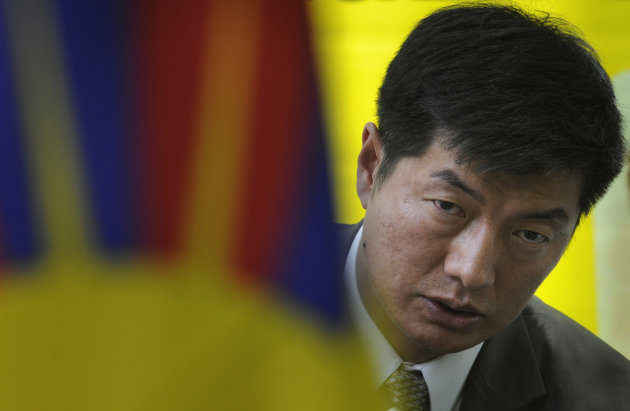
Newly elected head of the Tibetan government-in-exile Lobsang Sangay talks to the media after meeting with Tibetan …
Lobsang Sangay, the 43 year old Prime Minister elect of the Tibetan government-in-exile, says restoring the freedom of people in Tibet and the return of His Holiness the Dalai Lama to his native land, figure on the top of the to do list.
"To create awareness about Tibet and strengthen and sustain this awareness in the international forums will be another priority. Of course, education will be priority in the domestic programme and policy," Sangay, the youngest to head the government-in-exile, which is not recognised by any country, told IANS in an interview.
The new Kalon Tripa (Prime Minister) will take oath of office on Monday morning, at a ceremony presided over by Tibetan spiritual leader the Dalai Lama in this north Indian hill station town, headquarters of the government-in-exile for over half a century.
For the senior fellow of Harvard Law School, who has never visited his ancestral land, creating awareness on Tibet and educating the exiled youth are among the other crucial issues before him.
He has been busy preparing to shoulder the responsibility that has increased in significance after the Dalai Lama in May devolved his "political and administrative authority" to the elected leadership.
"My role is not to replace His Holiness but to fulfil his vision of a secular democratic society and live up to his expectation to have the Tibetan movement to stand on its own feet.
"As for the challenges, the Chinese government will always put pressure on different countries not to recognise the Tibetan administration. But we hope the members of the free world will acknowledge the democratic mandate I have received and democratic system we have consolidated in the Tibetan diaspora community," said Sangay.
On expectations from India in resolving the vexed issue of Tibet, he said, "We are tremendously grateful for the generosity of the Indian government and people for hosting us for the last 50 years. As a guest, we don't have expectations because enough is done by India but it's obvious that solving the issue of Tibet is in the best interest of India."
According to Sangay, who was born in a refugee settlement in the eastern Indian hill town of Darjeeling in 1968, the key challenges facing the Tibetan people right now is preserving the rich linguistic, religious and cultural tradition of Tibet which has come under assault from Chinese policies.
Sangay, who has spent the past 15 years at Harvard University, was once dubbed a "terrorist" by China because of his earlier association with the Tibetan Youth Congress, the largest radical group of exiles.
But he is now pursuing Dalai Lama's advocacy of genuine autonomy for the people of Tibet.
"I stand for the 'middle-way policy', which is seeking a resolution for the Tibetan problem within the framework of the constitution of the People's Republic of China," he said.
Sangay pursued his early education from a refugee school in Darjeeling and studied law from Delhi University, before moving to Harvard for his doctoral studies.
He has been chosen in the third direct elections for the Kalon Tripa that were held March 20. He will succeed the incumbent, Samdhong Rinpoche, who faced only two symbolic contests.
Sangay polled 55% of the votes cast by Tibetans around the world.
"My family will proudly take part in the inaugural ceremony at nine minutes past 9am and are looking forward to be blessed by His Holiness the Dalai Lama," he said.
His parents fled Tibet at the same time as the Dalai Lama, in 1959.
Some 140,000 Tibetans now live in exile, over 100,000 of them in different parts of India. Over six million Tibetans live in Tibet.
No comments:
Post a Comment